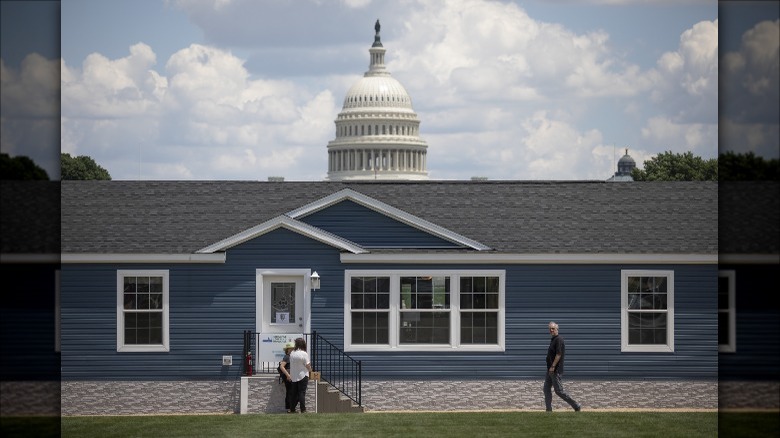All Of The Perks Available To First-Time Homebuyers
Owning a home is a dream for many, but often it's a goal that's simply out of reach. Especially in today's market, where homes are in short supply, and prices have soared to new heights, it might seem discouraging to prospective first-time homebuyers. Fortunately, there are some perks available to these future homeowners that can allow you to hold on to your dream.
According to Investopedia, there are a host of incentives that have been designed specifically to make it easier to buy your first home. From federal grants to tax credits, it might not make it easy to find your dream home, but it can potentially make it realistic and doable on your budget.
Who is considered a first-time homebuyer? Obviously, any individual purchasing their first home. But first-time homeownership criteria also apply to single parents who jointly owned a home with their spouse in the past and any person who has owned only residences that were not attached to a permanent foundation (a mobile home).
Help from HUD
The U.S. Department of Housing and Urban Development (HUD) is an ideal destination for a first-time homebuyer. Before you even start looking for a home, take advantage of HUD's free housing counselors. They will provide you with a lot of knowledge while also directing you to grant programs that could help you save money. While HUD does not disburse funds directly to individuals, they grant finances to non-profit organizations that help first-time buyers, per Investopedia. You can be directed to your local organizations by speaking to a HUD counselor.
A HUD counselor will help you determine how much you can afford by closely examining your financial forecast, credit score, and budget planning. They will also teach you everything you need to know about how mortgages differ, home appraisals, loan applications, and how to apply for a downpayment. Not to mention those who go through housing counseling have $11,300 less debt on their homes on average when compared to homeowners who do not go through counseling, according to HUD's official website.
Withdrawing from an IRA
When you open an IRA, an account is established to help you save money for retirement. In most cases, you cannot access these funds until you are 59 years old. If you choose to withdraw it sooner, there will be a penalty — usually 10% of the amount withdrawn. Receiving the funds early also means you have to pay taxes on them.
Despite these rules, there is one exception to the 10% penalty: taking funds out for first-time home ownership. This can be an effective option for those who want to be homeowners but don't have the financial means. If you are married and purchasing a home, you can each take $10,000 from your account without paying the penalty.
On the other hand, according to US News, drawing from your IRA pre-retirement should never be your first plan of action. It's important to remember there are consequences, even if you aren't paying a penalty — namely, a huge loss of future retirement funds since that money is no longer available to mature.
Options for Native Americans
Native Americans looking to purchase their first home can apply for a Section 184 loan. In fact, this loan is available to all Native Americans, not just first-time buyers. Unlike most loans, which determine their interest rate based upon the borrower's credit score, this loan bases its rate upon the prevailing market rate.
When this loan was formed in 1992 as part of the Housing and Community Development Act, it opened new doors for this community, allowing Native Americans residing in homes on reservations to get mortgages for the first time. The loan can be used either on or off-reservation lands, for construction or renovations on an already built home, or to refinance an existing home, according to 1st Tribal Lending. While a loan must obviously be paid back, the Section 184 loan provides an opportunity for Native American homeowners that otherwise would not be available.
Save money and the planet
First-time homeowners are often scraping by to pay the bare minimum to get into a home. However, if you have some wiggle room with your budget, there are investments you can make that will cost more initially but save you some major dough in the long run. Solar power is one of the main ways to do this.
If you install solar panels, you might receive a tax credit worth up to 22% of the cost. Replacing your windows or your HVAC unit with more energy-efficient versions also makes you eligible for the credit. This credit is going away after 2023, so if you want to replace your home with some energy-efficient systems, act quickly. It's not only good for your income but for the planet too.
According to Turbotax, you can claim your Residential Energy Efficiency Property Credit by filing Form 5695 with your tax return.
Security
Renting can make life unpredictable — the landlord can change your monthly payment to whatever they want to, whenever they want to. Buying a home brings security to the lives of those who may have been dealing with a financial rollercoaster prior. One perk of buying a home is the option to have a fixed-rate mortgage. While things might happen in the future, like the need to refinance your home, starting out as a new homeowner should bring you some stability.
Also, as Mountain America Credit Union reminds us, your house payments are going toward ownership, not someone else's profit. Not only that, but if you purchase a home in a hot market, your property will appreciate over time. When you sell it, it could be worth more than the amount you paid for it. This perk is quite possibly the best one — a lifetime of security, stability, and allowing you more financial options.





